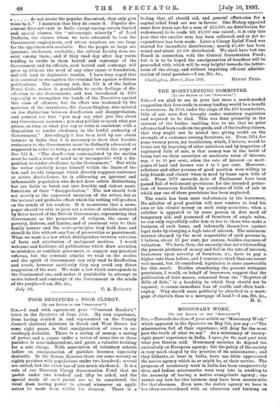POOR BENEFICES v. POOR CLERGY.
[To THE EDITOR OF TER "SPECTATOR."]
read with agreement your "Constant Reader's" letter in the Spectator of June 26th. My own experience, from having resided in and represented on the County Council electoral divisions in South and West Dorset for some eight years, is that amalgamation of cures is ex- ceedingly desirable. There is a saving of money, a saving of power, and a curate under a rector of some two or three parishes is semi-independent, and gains a valuable training for a sole charge. With association of voluntary schools before us, amalgamation of parishes becomes especially desirable. In the Sarum dioceses there are some seventy or eighty parishes with populations under two hundred ; several are united, but the union has of late much slackened. it is a rule of our Diocesan Clergy &ostentation Fund that no parish under two hundred and fifty be aided, and the special needs of each parish are to be considered, the rural dean having power to attend whenever an appli- cation be made from within his deanery. There is a
feeling that, all should aid, and general offertories for a capital relief fend are not in favour. One Bishop appealed some four years ago for a sum of £15,000, no distribution for endowment to be made till £5,000 was raised ; it is only this year that the smaller sum has been collected, and as yet no expenditure has been made. Later a Clergy Relief Fund was started for immediate distribution; nearly 21,400 has been raised and about £1,000 distributed. We shall have but one Board in connection with the Central Sustentation Fund.; but it is to be hoped the amalgamation of benefices will be proceeded with, which will be very helpful towards the better- ment of the clergy, and without impairing efficient adminis- tration of rural parishes.—I am, Sir, &c.,
Chedington, Dorset, Tune 291h. HENRY EETO.


































 Previous page
Previous page